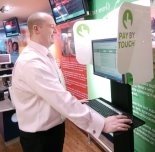 Tony Jones got to the counter, planted his finger on a scanner and got his cash. Fast. “No fumbling for IDs,” he explained after cashing his check at the Price Chopper at 85th Street and Wornall Road. “No waiting. I think it’s the bomb-diggity.”
Tony Jones got to the counter, planted his finger on a scanner and got his cash. Fast. “No fumbling for IDs,” he explained after cashing his check at the Price Chopper at 85th Street and Wornall Road. “No waiting. I think it’s the bomb-diggity.”More than 35,000 area customers have signed up to use fingerprint scanners since Balls Food Stores started installing them at 16 Price Chopper and Hen House locations two years ago to identify check-cashers.
The company has not cashed a single fraudulent check using the scanners, said Jerry Lutjen, director of loss prevention. The system has been so successful that Balls plans to expand the scanners to the checkout lanes soon.
Technology experts say it’s only a matter of time before people in Kansas City and across the nation will be scanning their fingers in exchange for gas and groceries, leaving their purses and wallets at home.
Store owners say they prefer the fingerprint scanners because they eliminate the possibility of fraudulent checks and often save them the cost of credit card and bank fees. For customers, it can be a fast and easy payment method — you don’t need an ID, or even a pen.
Experts in biometrics — the statistical study of biological characteristics — say that soon nearly everything, from office buildings to schools to cell phones, will use biometrics as a means of authentication.
Irises and fingerprints will be scanned, hand and facial dimensions will be digitally recorded, and a computer will tell you whether you’re you. And if you are, doors and digital accounts will be unlocked.
Not everyone is on board.
Barry Queen, owner of four area Price Choppers, said he will let other stores work the bugs out of the new system before he invests in the scanners, which can run $1,000 each. And Brett Shirk, executive director of the American Civil Liberties Union of Kansas and western Missouri, said that because biometric information is so personal — after all, it’s a part of you — it needs special government regulations that limit who has access to it. “In the absence of regulation, we’re in a position where the biometrics industry says, ‘Trust us,’ ” he said.
Yet this technology, industry experts say, is the future — and much of it is already in place.
Nine of the 10 leading computer manufacturers offer machines with built-in fingerprint sensors, mostly aimed at businesses, said Jim Burke, a vice president with AuthenTec, a Melbourne, Fla.-based company that sells the sensors. They cost about $50 extra.
And, Burke said, 5 million cell phones in Japan and Korea are equipped with the sensors, enabling only the owner to unlock it. He said phones with fingerprint sensors will be available in the United States within a year as Americans move toward storing more personal information on their phones.
Biometric sensors are also granting, and denying, people access to schools and fitness centers, said Walter Hamilton, chairman of the International Biometric Industry Association, in Washington. And they’re also replacing time cards.
Biometrics “is still in its younger days as an industry,” Hamilton said. “It’s still evolving. I think it’ll touch everyone here in the next five years or so.”
On the way
 Kansas Citians could be buying goods with their fingerprints within months. Balls Food Stores plans to begin testing the scanners in its checkout lanes this fall. And HyVee will test scanners in some stores this summer, a company spokeswoman said, although the company has not decided whether to test them in Kansas City.
Kansas Citians could be buying goods with their fingerprints within months. Balls Food Stores plans to begin testing the scanners in its checkout lanes this fall. And HyVee will test scanners in some stores this summer, a company spokeswoman said, although the company has not decided whether to test them in Kansas City.The scanners have already taken off in other parts of the nation. More than 2.5 million people have signed up for Pay By Touch, a San Francisco-based company, including customers at 240 grocery stores in Chicago.
Although the scanners aren’t cheap — Pay By Touch charges about $1,000 per checkout lane, including installation costs, software and customer support — one incentive for store owners is lower transaction fees.
For a $25 purchase, credit card companies usually charge from 80 to 95 cents and banks charge 35 to 40 cents for a debit card or check, said Pay By Touch marketing director Shannon Riordan.
A Pay By Touch customer who uses the company’s payment system, eCheck, costs the store 10 to 20 cents. (However, if the customer links the fingerprint to a credit or debit card, the store pays the full fees.)
Kal Abhari manages the only gas station in Missouri with Pay By Touch scanners, an Express Mart south of St. Louis. He said his station saves $300 to $500 a month in transaction fees.
The machines work similarly to credit card machines with no need to sign or show ID. Users scan their index fingers. The system also requires a 10-digit PIN — usually a phone number — to identify the user. In addition, the federal agency in charge of airport security is scheduled to implement a “Registered Traveler” program this month in which people who sign up can bypass security checks with a “smart card” containing their fingerprints. A Kansas City International Airport spokesman said the airport doesn’t plan to participate, but Kansas Citians could encounter the program at other airports.
Security concerns
Proponents of biometric technology say it’s far more secure than traditional means of verification.
 But Shirk of the ACLU said the nation is rushing too quickly into biometrics, with people giving up their personal data before thinking about who has it and what they can do with it. “Technology is expanding with lightning speed, and the law isn’t keeping up with it,” he said. “There are no legal controls over whether that information can be sold. Can it be turned over to law enforcement without a warrant?” Hamilton of the International Biometric Industry Association said his organization urges biometric companies not to share personal information without the consent of the customer. And computers usually store only pieces of useful information about the scanned image, Hamilton said, not the actual image.
But Shirk of the ACLU said the nation is rushing too quickly into biometrics, with people giving up their personal data before thinking about who has it and what they can do with it. “Technology is expanding with lightning speed, and the law isn’t keeping up with it,” he said. “There are no legal controls over whether that information can be sold. Can it be turned over to law enforcement without a warrant?” Hamilton of the International Biometric Industry Association said his organization urges biometric companies not to share personal information without the consent of the customer. And computers usually store only pieces of useful information about the scanned image, Hamilton said, not the actual image.
“I’m not sure what you’d be able to do with it,” Hamilton said. “You couldn’t recreate a photograph or picture of the eye or a pattern of my fingerprint.”

